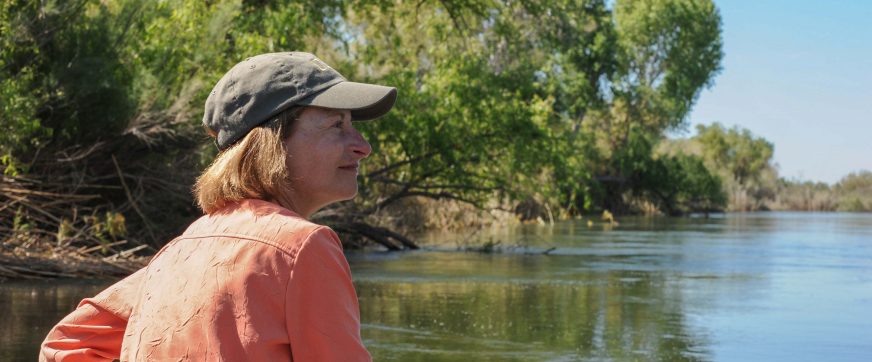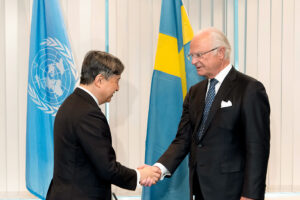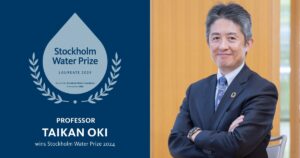Six questions to Sandra Postel – Stockholm Water Prize Laureate 2021
On 22 March you were announced as the recipient of the world’s most prestigious water award, how did that feel?
For me, receiving the Stockholm Water Prize is the greatest honor imaginable. When you dedicate your life to something, over time you wonder if you’ve really made a difference. So, I’m very grateful to have this affirmation. I am also keenly aware that one never stands alone in these moments. I have worked with many wonderful colleagues, for whom I am so grateful.
Why have you chosen to dedicate your life to water?
I feel very fortunate that I found a purpose for my life when I was quite young – and that was to do something on behalf of the Earth. Freshwater became my niche right after graduate school, when opportunities to work on national and global freshwater issues came my way. I have to say that Sweden’s own Professor Malin Falkenmark had a big influence on me. I read her ground-breaking work and first met her in my mid-twenties when she visited the research institute in Washington DC., where I was working. She encouraged me to think broadly about global water issues, particularly in relation to food and agriculture. To this day, I am very grateful to Professor Falkenmark for sharing her expertise and encouragement.
So, what is the most important thing people should know about water?
Water is the basis of life; it is finite; and it has no substitutes. Unlike coal, oil, or copper, water is much more than a resource to exploit – it is the source of life itself. While this may seem obvious, we often do not use and manage water in ways that reflect this truth. Our impressive engineering – dams to store water, diversions to move it around, powerful pumps to tap groundwater, tall levees to control floods – has allowed us to control water to expand human civilization. But this approach has broken the natural water cycle, and we are now experiencing the consequences. Major rivers are running dry, groundwater is being depleted, wetlands are being drained, and freshwater life is disappearing. Maps of water stress grow redder and redder with each passing year.
Our challenge now is to replenish and repair the water cycle – to work with nature rather than against it – even as we remain a prosperous society. This will also be critical to building resilience to the impacts of climate change. Fortunately for every way in which we’ve broken the water cycle, there are demonstrated solutions to begin to repair it. It will take collaboration and ingenuity, but we can do it.
What kind of change would you like to see?
We need to establish a new ethic to guide our use and management of water, one based on the principle that all living beings – human and non-human – deserve to receive the water they need to thrive. This might sound radical, but it’s not. It recognizes our interdependence with the web of life. From that foundation, we then begin to manage water differently. For example, we operate dams so as to provide more natural flows to rivers, which in turn helps sustain fish and other aquatic life. We reconnect rivers to their floodplains, which recharges groundwater, reduces flood risks, and creates critical habitat for fish, birds, and wildlife.
A good sign is that we are starting to look toward nature-based solutions to solve our water challenges and prepare for climate impacts. Combined with water conservation and efficiency measures, these types of solutions can solve multiple problems simultaneously. Restoring soil health, for example, stores more carbon and water in the soil, reduces the polluted farm runoff that causes harmful algal blooms, and builds resilience to droughts and floods.
What can I do as an individual?
The first thing is to become aware of one’s source of water: where does the water flowing from our tap come from? When we understand that, we start caring for our water sources. I believe in constantly expanding this community of concern around water.
Second, we can learn more about our own water footprint and just how much water it requires to keep our lifestyles afloat – from the foods we eat to the energy we use to the clothes we wear. This is not to make us feel guilty, but to feel empowered to be part of the solution. When we realize that it can take as much as 2,600 litres of water to make one cotton shirt, we might ask ourselves if we really need to own so many cotton shirts.
A great way to reduce our personal water footprint is to reduce waste – not just of water, but of food and energy because it all takes water to make. Every time we throw a cup of coffee down the drain, we’re throwing the equivalent of 130 litres of water down the drain, because of the water required to grow those coffee beans. Moreover, if those coffee beans come from Ethiopia, we’re impacting water sources there. Reducing waste of food, energy, and material things, as well as of water directly, is an easy way to lighten our personal water footprint on the planet.
It might seem that one individual cannot possibly make a difference, but if hundreds of millions of us act together to shrink our personal water footprints, we can indeed make a difference.
Are you optimistic about the future?
I am guardedly optimistic. When I wrote my most recent book, Replenish: The Virtuous Cycle of Water and Prosperity, I found that for just about every major water challenge out there, we can identify a solution that is working to build a more resilient and secure water future. But the challenges are growing at a faster rate than we’re scaling up those solutions. So, we need to act with more urgency. And I do despair about the loss of freshwater life. Just in the last fifty years, the populations of fish, frogs and other freshwater vertebrates have declined by an estimated 83 percent. But I remain optimistic that we can bring some of these populations back. We’ve seen this many times, for example, when we remove an obsolete dam or add flow to a depleted river, fish populations bounce back. If we give it a chance, nature heals.








